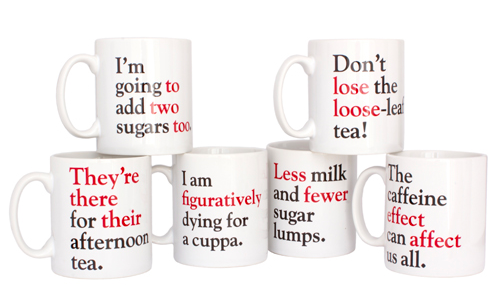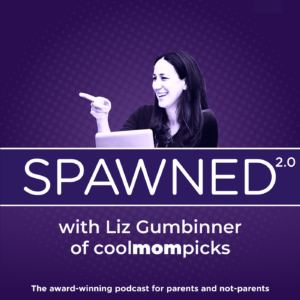We all have our pet peeves, and one of mine happens to be spelling and grammar. Even a text message with they’re/there/their used incorrectly is enough to make me cringe. (To say nothing of all the pitches we receive daily that assure us “mom’s will love this!”) That’s why this set of mugs would be perfect for starting every grammatically-correct day.
I love how the Grammar Grumbles mugs from The Literary Gift Company illustrate the proper use of two/to/too and clarify that no one will actually die if they don’t get what they’re yearning for. (It’s a figure of speech, hence “figuratively.” Get it?) Succinct, educational, and hilarious too, in the same vein as the Grammar Rules dishes we recently found.
Related: Grammar Rules Dishes end the debate about good vs well
Even if you don’t take grammar as seriously as I do, I still think these mugs are great reminders of the rules. They might even make you think twice about whether to use less or fewer when you’re writing that email to your boss.
How cool–a mug that delivers caffeine and might save you from an embarrassing grammatical blunder. I’m sold.
Get the set of six Grammar Grumbles mugs at The Literary Gift Company.





I am the grammar police so, as you can imagine, these make me incredibly happy. Where can I get them? I want them all. 🙂
I feel bad for those who speak badly. Maybe these will help.
Or do you feel badly?
Ha.
Only if her hand’s broken.
Awesome.
I think we feel badly for those who speak poorly.
Thank you. I cringe when I hear someone say “I feel badly”, however, I hear it so often (even from highly educated people) that I was beginning to wonder if I was wrong. Thanks for the reinforcement!
I also cringe when reading descriptions of recipes that proclaim “It tasted wonderfully!” I don’t want to think about my food tasting me back.
The to/two/too mug should have a comma before “too.”
Take THAT Grammar Grumbles.
Tamara, I was just going to make the same comment! 🙂
Not so. That is actually not a rule but a common error that English teachers often advocate for some reason.
The basic rule of application of a comma is “use it when you would pause if speaking”. Thus, the coffee mug should indeed have a comma after the word “sugars”. We can get into the minutia for days, but the point of punctuation is to clarify communication, and generally, more commas is better at clarifying “voice” in a written communication. According to centuries of convention in composition, including the comma before the “too” in this case is more appropriate than skipping it.
—
Well, admittedly we haven’t studied centuries of convention in composition Jean-Marc, but it seems pretty clear through every source we check that you can use — or omit — a comma for additional emphasis. According to Ask the Grammarian: “There is no rule that states I have to use commas to set off the word too when used to mean also in a sentence. Similarly, there is no rule that says I can’t either. The choice, it appears, is stylistic. If you want your sentence to read smoothly, forget the comma.”
Don’t you feel liberated by that? We do too!
And since you’re a student of punctuation, thought we’d point out that the basic rule of application of a period is “use it inside of the quotation.” <-- Like that. -Eds
Grammar in context is about communication. As one professor stated, grammaticality is dependent on your audience. This will be grammar treason to many of you.
This comment is from my friend, Peter:
The following sentence has a grammatical error: “…from The Literary Gift Company illustrate the proper use of two/to/too and clarify that no one will actually die if they don’t get what they’re yearning for. (It’s a figure of speech, hence “figuratively.” Get it?)”
Pronouns such as “no one”, “everyone”, “each person” etc. are in the third person singular so should be followed by “he (or he or she if one wants to be pc) doesn’t get what he/she is yearning for.”
It really rankles me and makes me cringe to see bad grammar used by grammatical pedants. 🙂 (Just in case the joke is lost.)
—
Eds: Thanks Evy! You and your friend Peter are smart cookies. Traditional grammarians indeed cringe at the use of the “singular they,” which came of favor in the 70’s when the formerly generic “he” became less appropriate for representing both male and female individuals. The singular they has now become acceptable conversationally by most sources, and in writing form by some sources (including Jane Austen, William Shakespeare, and the New International Version Bible) yet not by many others. But eh, what can we say. We write conversationally here, use lots of fragments, and start plenty of sentences with “and,” while ending many in prepositions. Sometimes both at the same time! Creative license. [<- Sentence fragment] Also, our resident grammatical pedant would like Peter to know that commas belong inside of his quotation marks unless he's British. 🙂
The use of “they’re” in this context often reflects a dilemma caused by the lack of a gender-neutral pronoun. I think in many cases people who commit this error know what they are doing and are choosing to do so because they consider a minor grammatical error (I know there are some who would claim that there are no “minor” grammatical errors but, oh well…) less offensive than omitting half the world by choosing one gender or the other when referring to members of a mixed-gender group. It is actually an error forced by the limitations of the English language.
There is no apostrophe for plurals – moms not mom’s
—
Exactly! -Eds
It should be “The Literary Gift Company illustrates…”
—
Eds: In this sentence, it is the mugs (plural) that illustrate the proper use of grammar–the mugs (from The Literary Gift Company) are the subject and so the subject/verb agreement is accurate. But thanks for reading our copy so closely, Bruce! We appreciate the attention.
None of these six concerns an issue in grammar. Four concern spelling (homophone confusion) errors, and two concern usage, one of which (“figuratively/literally”) isn’t an error at all. To say “I’m literally dying for a cuppa” is to use “literally” in its hyperbolic sense, which is fine; it has been established in the language since before the American revolution.
Since when did “literally” have a hyperbolic sense? Isn’t that like saying, “I meant ‘literally’ figuratively”?
No. “Literally” is been for exaggerated emphasis since at least the 1760s. See this good, comprehensive discussion by Stan Carey:
https://stancarey.wordpress.com/2011/01/31/literally-centuries-of-non-literal-literally/
Here’s another sensible piece on this one from the Macmillan Dictionary blog, by Michael Rundell: https://www.macmillandictionaryblog.com/this-will-literally-have-you-in-stitches
And another one, in Slate, by dictionary editor Jesse Sheidlower, wherein he writes:
Why, though, did this usage of literally suddenly come under such fire? It is not the first, nor will it be the last, instance of a word that is used in a seemingly contradictory way. There are many such words, and they arise through various means. Called “Janus words,” “contranyms,” or “auto-antonyms,” they include cleave (“to stick to” and “to split apart”), dust (“to remove dust from” and “to sprinkle dust upon”), moot (“able to be discussed; arguable” and “purely theoretical”) and peruse and scan (each meaning both “to read closely” and “to glance at hastily; skim”). Usage writers often criticize such words as potentially confusing and usually single out one of the meanings as “wrong,” the “right” meaning being the older one, or the one closer to the word’s etymological meaning, or the one more frequent when 18th-century grammarians began to examine language systematically. It’s not always possible to predict when something will be condemned: While the “skim” sense of peruse is often criticized, the “skim” sense of scan—the main current sense—is rarely noticed, even though it’s a recent development, quite different from the meaning the word had for centuries.
In the case of literally, the “right” meaning is said to be “exactly as described; in a literal way,” because that’s what the base word literal is supposed to mean. In fact, the literal meaning of literal would be something like “according to the letter,” but it’s almost never used this way. “He copied the manuscript literally” would be one possible example. So when we use literally to refer to something other than individual letters—to whole words, or to thoughts in general—we are already walking down the figurative path, and if we end up with people eating curry so hot that their mouths are “literally on fire,” how surprised can we be?
*That is: “Literally” has been used for exaggerated emphasis since at least the 1760s.
I love this and may send a few to some of my Facebook friends. They are the worst offenders… Sometimes it is too painful to read their status updates because they are so full of grammatical errors. Your/you’re, It’s/Its, their/there…
“Sometimes it is too painful to read their status updates because they are so full of grammatical errors. Your/you’re, It’s/Its, their/there…” For those of us who care about the niceties of expression, it’s important to note that these are not “grammatical errors.” Instead, they are errors in spelling, and they’re common, even among those who are capable spellers. When someone chooses the wrong symbols to form the word he intends to write, the mistake is in spelling, pure and simple.
And the use of “literally” in its hyperbolic sense has been established in the language since before the American revolution.
I’d have to disagree, Don. It’s one thing to make a typo and confuse it’s and its. But when someone has no idea when their “they’re” should be “there,” it’s a grammar issue.
Also, I love all of you who noticed the missing comma in to/two/too. #grammarpoliceunite
No, Jen. When someone (intuitively) understands the grammar and knows what he intends a word to mean in context but then misspells that word, the mistake is in orthography, not in grammar. Spelling errors sometimes impinge on grammar, as they can in this case, but, fundamentally, they remain spelling errors, no question.
—
Don, we love your passion for this subject. But it’s unfair to say “no question” because clearly there is a question, and not everyone is in agreement with you. Grammar is often defined as the entire system and structure of language. Grammar blogs, grammar books, grammar glossaries contain sections on homonyms and homophones. Which is all beside the point, considering Grammar Grumbles is just a clever name for a series of mugs that address parts of speech. We’re thrilled this small business is getting so much attention and, we hope, lots of orders.
In any case, let’s get back to having a happy holiday season and arguing over something super important like football. Peace everyone.
Thanks. I say “no question” not because I think the subject isn’t open to argument (or to disagreement) but rather because it’s a rhetorical means of asserting that, despite disagreement, among grammarians the question is settled. And it is. Strictly speaking, spelling really isn’t part of grammar. Spelling precedes grammar. Grammar concerns itself with the conventions that govern the structure of language–syntax and sentence formation. When you’re looking at words in isolation, as you are when you consider spelling (and usage), grammar seldom comes into play.
Only do that if you want to be a pain in the neck and lose your friends. I don’t understand why people like to use their education to try to pick at other people. And that is coming from an editor. Yes, there are all sorts of errors on facebook. However, many of the so-called errors you wish to point out are not in fact considered errors if you take into account the informal register; for instance, it is completely acceptable to use “less” in place of “fewer” in a facebook status. Even in the case that it is in fact an error, it is not appropriate to use your knowledge to try to bring someone else down. Notice it, laugh to yourself if it is funny, and move on.
I find the need to poke at other people’s language is usually a result of insecurities regarding one’s own understanding of language, which on occasion actually results in embarrassingly incorrect corrections. Consider that before you pick at someone. Also, you should learn the definition of “grammar” before you try to correct it for someone.
I love these! I’m a grammar geek myself! I wish there was one that said, “Happy holidays or Merry Christmas from The Smiths instead of The Smith’s! lol Almost everybody makes this mistake! 🙂
My theory is that people don’t learn proper spelling, grammar and punctuation because they don’t much use their hands to write it out when they’re learning it all. When your hands do it, your brain learns the correct processes of constructing a sentence and all the elements therein. When you’re typing, all your brain is absorbing is that you’re pushing buttons, and one button is the same as another to your brain, so it has no mechanical foundation to help your eyes differentiate the right way from all the wrong ways.
What I really wish someone would do is school the people at Jeopardy on that thing about keeping punctuation inside quotation marks; and also, those quotation marks they’re using are actually feet and inches marks rather than proper apostrophes and QMs. It drives me crazy that a show quizzing people on higher knowledge would miss such rudimentary details!
Grammatically-correct day…
https://www.chicagomanualofstyle.org/qanda/data/faq/topics/HyphensEnDashesEmDashes/faq0010.html
—
“So it is a matter not of who is right or wrong but of whose rule you are going to follow.” That can sum up so much of English grammar, can’t it? -Eds
Well, it’s not just the Chicago Manual that lists that rule–it’s pretty much universal.
These are awesome, but come from UK ($$$$ shipping). Any chance someone sells them in the US?
—–
We found similar ones on Zazzle, Jan, which are featured in our Holiday Gift Guide if you scroll down to gifts for grammar geeks. Ship from the US. -Eds.
These would be good for expresso, ect. ;-}
(That was a joke. Don’t go nucular on me.)
Ha!!
I am the worst at grammar and spelling my friend is forever correcting me and I never get it right.
I love these! How about ‘Your tea for when you’re thirsty’?
Why is there no comma between “sugars” and “too?” You have failed. I am saddened by this error.
—
Eds: Brian: Ha, there was a big debate about this on our Facebook page too.
(Notice deliberate elimination of comma.)
There is no rule that states that you need to use a comma before words like “also” or “too” when they end a sentance unless want to create additional emphasis. In other words, it’s a stylistic choice.
I’m surprised that your article uses “they” to refer to “no one”- a singular pronoun. Just sayin’.
—
Eds: Love this discussion! We could debate this one all day — and have at times — but we have to go with the frustrating but increasingly acceptable use of “they” as the best possible solution for a gender-non-specific singular pronoun since no other exists in English. Unless you want to get into “ze” which we don’t. Sometimes we work around it, and sometimes it’s just too much verbal gymnastics.
If you really want to get geeky, have fun diving into Wikipedia’s entry on the Singular They which describes that “it has a long history of usage and is common in everyday English” then goes to cite references back to Chaucer, Shakespeare, Thackeray, Jane Austen.
Because we write more conversationally than by-the-book journalistically here, we try to find the right balance so that we sound more like human beings who take some literary license, than not OED editors. Sometimes that means using the singular they, sentence fragments, or sentences ending in prepositions– and cross our fingers that we are not single-handedly destroying the English language.
Not “if they don’t get what they’re yearning for.” but “if they don’t get that for which they are yearning.”
—-
Eds: “When a memorandum passed round a certain Government department, one young pedant scribbled a postscript drawing attention to the fact that the sentence ended with a preposition, which caused the original writer to circulate another memorandum complaining that the anonymous postscript was “offensive impertinence, up with which I will not put.”
The story is often attributed to Churchill, which is dubious, but we have to agree with the sentiment.
As a linguist and an ESL teacher, I’d like to point out that almost none of these are actually grammar rules. Mostly spelling rules or semantic issues (e.g. figuratively). I also find it fascinating how desperately people (mostly in these comments) cling to and defend such totally arbitrary rules, to the point that they’ll belittle those who communicate perfectly well without knowing every silly, often archaic prescription. Language (in all of its manifestations) is a phenomenal piece of social invention that exists in human communication, not in some old grammar books!
Is it okay for me to call my mother’s mother Grammar?
I have almost given up. Almost without exception, you’ll never find a post on any Forum on the Internet that does not make a grammatical mistake. It’s as if English grammar is simply no longer taught by the government schools. Hence, everyone sounds like a low-life.
Remember when so many grammar rebels thought it was cool to never capitalize any word and to never use a period to separate sentences? Well now the new cool is to use bad grammar, as if it’s a thing of pride. And that’s not to mention all the obscene language. The f word is now the new favorite adjective in America.
I’m almost ready to raise the white flag and concede that in America there exists no more grammar rules and no more moral rules. The majority appears to be contented with just plain lawlessness on all fronts.
I suppose proper grammar would replace “they’re” with “they are”, meaning these cups are as just wrong as the people who use “their” in place of the former. Please, if you are to correct a person’s grammar, do it properly and avoid contractions.
—-
/mansplain
Fascinating discussion! Or should I say “I find this discussion fascinating”?